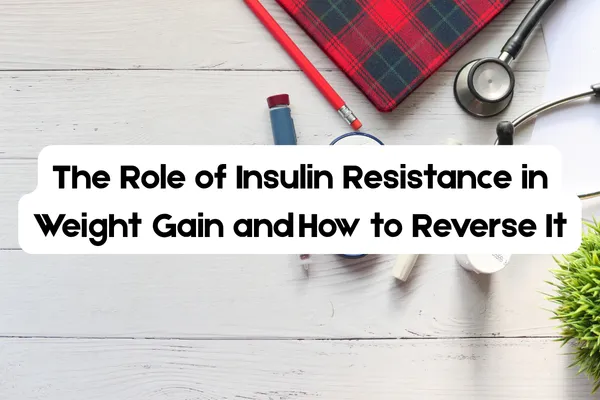
The Role of Insulin Resistance in Weight Gain and How to Reverse It
Understanding Insulin Resistance: More Than Just a Blood Sugar Problem
Insulin is a hormone produced by your pancreas that helps your body use glucose (sugar) for energy. When everything is working properly, insulin acts like a key that unlocks your cells, allowing glucose to enter and fuel your body.
Insulin resistance happens when your cells stop responding properly to insulin. As a result, your body produces more and more insulin to compensate, leading to higher insulin levels and, often, increased fat storage. This condition affects approximately 40% of adults in the United States and is considered a precursor to type 2 diabetes.
Over time, insulin resistance can lead to:
Persistent weight gain, especially around the belly (visceral fat accumulation)
Low energy levels and chronic fatigue
Cravings for carbs and sugar
Higher risk of type 2 diabetes, heart disease, and metabolic syndrome
Increased inflammation throughout the body
Disrupted sleep patterns and mood changes

Inflammation increases.
Research shows that in obesity, inflammation takes place in various tissues, including adipose tissue, skeletal muscle, liver, gut, pancreatic islet, and brain and may contribute to obesity-linked metabolic dysfunction.
The Vicious Cycle
Studies demonstrate that insulin resistance is a consequence of weight gain, suggesting a possible intracellular protective mechanism against substrate overflow. This creates a frustrating cycle: weight gain worsens insulin resistance, which makes it even harder to lose weight and keep it off.
Recognizing the Signs: Are You Insulin Resistant?
Not everyone with insulin resistance has obvious symptoms, but common signs include:
Physical Signs
Difficulty losing weight, even with diet and exercise
Increased waist circumference (apple-shaped body)
Skin changes like dark patches around the neck, armpits, or groin (acanthosis nigricans)
Skin tags in areas of friction
Energy and Mood Symptoms
Fatigue, especially after eating carbohydrate-rich meals
Brain fog or difficulty concentrating
Mood swings and irritability
Frequent sugar and carbohydrate cravings
Metabolic Markers
Elevated fasting glucose (over 100 mg/dL)
High triglycerides (over 150 mg/dL)
Low HDL cholesterol (under 40 mg/dL for men, under 50 mg/dL for women)
High blood pressure (over 130/85 mmHg)
If these symptoms sound familiar, you are not alone. Insulin resistance is incredibly common, but the encouraging news is that it can be reversed with the right approach.
Evidence-Based Strategies to Reverse Insulin Resistance


3. Stress Management and Sleep Optimization
Chronic stress and poor sleep are major contributors to insulin resistance:
Stress reduction techniques:
Meditation and mindfulness practices
Deep breathing exercises
Regular time in nature
Engaging in enjoyable hobbies
Sleep hygiene practices:
Aim for 7-9 hours of quality sleep nightly
Maintain consistent sleep and wake times
Create a cool, dark sleeping environment
Limit screen time before bed
4. Advanced Medical Support
As a medical practice, NiuOla Health can offer comprehensive tools beyond lifestyle changes:
Comprehensive lab testing
Fasting glucose and insulin levels
Hemoglobin A1C
Lipid panels
Inflammatory markers (C-reactive protein)
Hormone assessments
Evidence-based medications when appropriate
Metformin for insulin sensitization
GLP-1 receptor agonists for weight management
Targeted supplements based on individual needs
Ongoing monitoring and adjustment
Regular follow-ups to track progress
Medication adjustments as needed
Personalized treatment plans
The Path Forward: You Are Not Failing
Many of our patients come to us feeling discouraged, like they have tried everything without success. Here's what we want you to understand: weight gain and difficulty losing weight are not always about willpower or personal failure. Research shows that weight loss improves insulin sensitivity, and successful long-term weight loss maintainers demonstrate enhanced insulin sensitivity compared to controls.
Insulin resistance can be a major piece of the puzzle that explains why traditional "calories in, calories out" approaches often fall short. When your metabolism is working against you due to hormonal imbalances, sustainable weight loss requires a more sophisticated approach.


If you suspect insulin resistance might be affecting your weight, energy, and overall health, we are here to help. At NiuOla Health, we understand that each person's journey is unique, and we provide personalized, evidence-based care that addresses the root causes of metabolic dysfunction.
Your health journey matters, and you deserve support that goes beyond generic advice. We work together to create meaningful, lasting change for your body, your confidence, and your future.
